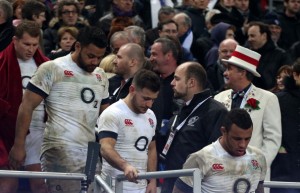
Who expected a host win?: Pape celebrates a last gasp victory, denying England their greatest comeback ever
By Charlie Morgan
Heart-breaking, gut-wrenching. Gael Fickou’s score that won Le Crunch for France on Saturday evening was a bitter body blow for Stuart Lancaster and his side. Leading 24-19 deep into the last ten minutes, they had hauled themselves back from a 16-3 deficit to the cusp of a wonderfully dogged victory – what would have been the biggest comeback in their history. Then a teenage replacement snatched it all away.
As boring and inescapably British as it is to celebrate brave losers, there were plenty of constructive facets to emerge from England’s performance in Paris. There were worrying aspects, too. Here are five lessons to heed ahead of a tough trip to Murrayfield.
Slow starts, fading finishes
Before exploring better aspects, it’s best to begin with a stinger. England have now lost their last two Tests. While that will feel painful enough, there has been excruciating symmetry to each reverse. Against New Zealand in November, they also conceded two first-quarter tries, rallying superbly before relinquishing control once more.
France’s early efforts both required fortunate bounces, but they were entirely avoidable. Joe Launchbury’s misjudgement from the opening kick-off gave Jack Nowell little chance of gathering, while Huget’s brace was completed after two uncharacteristic mistakes – Tom Wood losing the ball in contact and Alex Goode scrambling ineffectively. Given the collective ambition and determination of the next hour, a nervy 17 minutes stood out alarmingly.
As for closing the game out, the hosts must be given credit. The athleticism of Yannick Nyanga, Wesley Fofana and even Dimitri Szarzewski in wide channels allowed them to stretch their opponents to breaking point. Still, England will have to win a close one soon to halt any lingering doubts. When Wales and Ireland come to Twickenham, playing for 80 minutes is essential.
Jack the likely lad
A cluster of errors and one shuddering hit from Louis Picamoles at the outset of their international career would transform most 20 year-olds into whimpering wrecks. Not Nowell. Before Brice Dulin’s googly of a chip bamboozled him for Les Bleus’ second try, the young Cornishman had already spilt the kick-off, got exposed by Jules Plisson’s diagonal punt and conceded precious field position with a needless challenge in the air. Some said he was out of his depth. Rubbish.
From England’s first meaningful possession, Nowell was prominent, offering himself across the line and around the fringes as an elusive, deceptively powerful runner. As players grew tired, he made more headway and ended up with 87 metres from 10 carries. He was rock-solid one-on-one in defence too, often against far burlier runners. Had a knock not forced him to make way for Brad Barritt, England may have maintained their shape well enough to prevent Fickou’s winner.
Either way, the young Chief’s perseverance epitomised the self-belief that Lancaster’s set-up breeds. In a hostile atmosphere on Test debut, Nowell seemed confident he belongs on the biggest stage – and with good reason. He is absolutely here to stay.
Tactical nous, tempo and skill
With Philippe Saint-André announcing a forward-heavy 23 a week prior to the match, England knew exactly what France would bring: a destructive set-piece and fierce focus on breakdown spoiling. Lancaster combated that intelligently. Knowing his dynamic pack would have the hosts wheezing with punchy phase-play, he brought in Danny Care at scrum half to maintain tempo. The Harlequin repaid that faith – a quick-tap penalty led to Mike Brown’s maiden international try and lit the spark that gave the visitors belief.
Despite soggy conditions and a stodgy surface, England’s handling was good and attacking structures – either close to the ruck or wider with two waves presenting out-the-back options – much improved. Executing 14 offloads and attempting a few more that didn’t quite stick, they endeavoured to keep the ball alive and transfer the point of contact, putting defenders off balance so powerful carries from Billy Vunipola and Courtney Lawes could take full effect.
Impressive close-quarter skills and awareness across the board – Dan Cole and Joe Marler were link-men on more than one occasion – meant the plan worked well. More refreshingly, we have an England side that is exciting to watch and (though the scrum needs a bit of attention) doesn’t compromise on muscularity.
Bench bother
Lancaster doesn’t gamble on players’ ability. He is a canny man-manager and talent scout who will only allow someone into the international fold if they possess the right aptitude and attitude to deal with it. Luther Burrell, for instance, looked unruffled all evening. Where England did take a calculated risk was among the backs on their replacements bench.
Most bases were covered. An early injury to Jonny May meant Goode slotted in at full back and Mike Brown went onto the wing, where he excelled. What the 23-man party could not deal with was another wide-man going. When Nowell was struggling late on, Brad Barritt was the only man left. Burrell was pushed wide, France smelled blood in the water and somehow struck.
You don’t make too many mistakes with hindsight, but while forced and tactical changes up front went well – Dave Attwood, Ben Morgan, Mako Vunipola and Tom Youngs all contributed – Care’s withdrawal was also a moot point. Having threatened all night, could he have helped England edge home? As it was, England found themselves five points up at a scrum in the French 22 with less than 300 seconds left. Even with a vastly re-jigged 15 on the pitch, they should have held out.
Farrell comes of age
Finally, we come to the overwhelming English success of a stunning contest at the Stade de France. Whether Owen Farrell remains at fly-half or shifts one out to accommodate George Ford, he has to be part of Lancaster’s plans for 2015 and far beyond. On Saturday he matured from promising, tenacious competitor into well-rounded, clinical game-manager. His distribution, defence-scanning and mix of kicking out of hand – whether finding turf and touchline or giving teammates something to chase – was the best it has ever been. Forcing himself flat to the gainline, he posed significant problems as a runner as well.
Remarkably still 22, he has inherited a good portion of his father’s presence and – along with Billy Vunipola, Joe Launchbury and Manu Tuilagi – should form the spine of this team for the more than a decade. The week will be tough with Scotland on the horizon and disappointment hovering, but Farrell is the sort of uncompromising character who won’t tolerate anyone feeling sorry for themselves. From here, England must target four consecutive victories. Farrell will agree.







